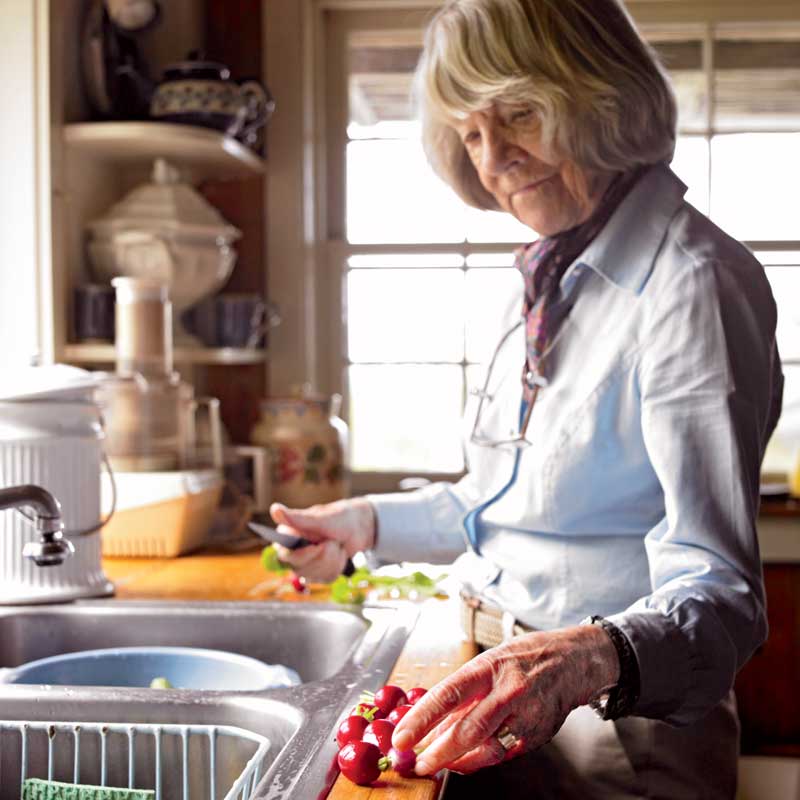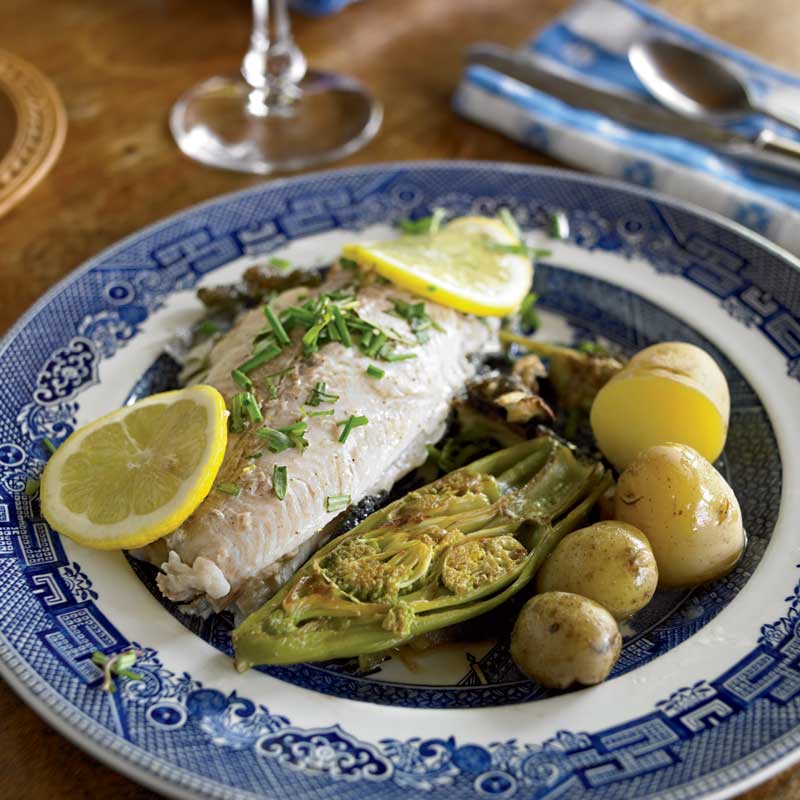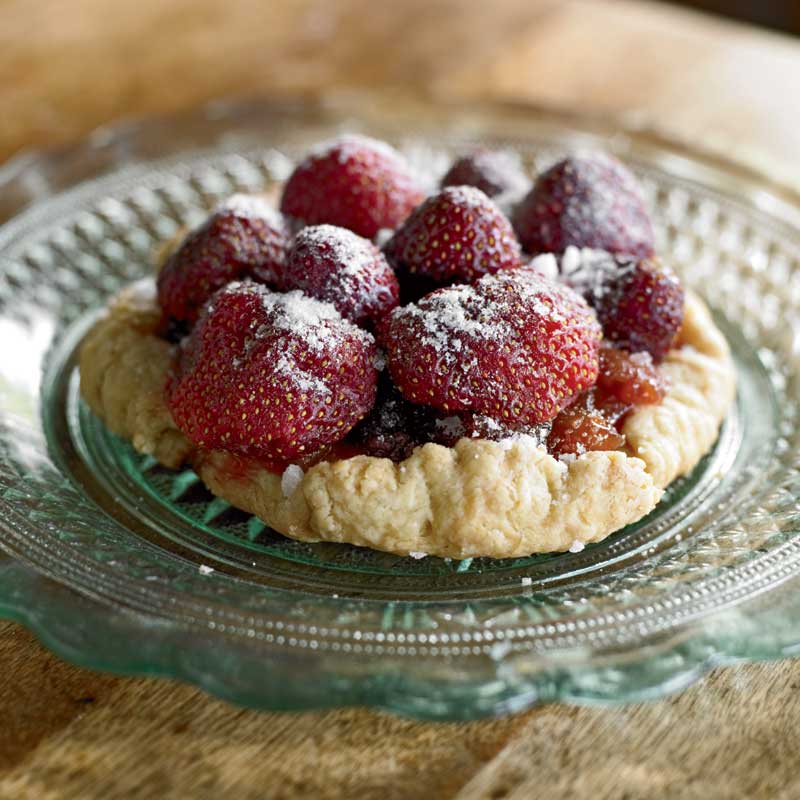Lunch with a Legend: Judith Jones
Yankee spends a day with editorial icon Judith Jones, one of Vermont’s most accomplished summer residents. For anyone who writes, especially anyone who writes cookbooks, meeting Judith Jones–the longtime editor of John Updike and Anne Tyler, the visionary who famously turned Julia Child and Mastering the Art of French Cooking into household names, and an […]

In the kitchen of her Vermont farmhouse, editor Judith Jones masters the art of garden-fresh cooking.
Photo Credit : Robbins, HeathYankee spends a day with editorial icon Judith Jones, one of Vermont’s most accomplished summer residents.

Photo Credit : Robbins, Heath
For anyone who writes, especially anyone who writes cookbooks, meeting Judith Jones–the longtime editor of John Updike and Anne Tyler, the visionary who famously turned Julia Child and Mastering the Art of French Cooking into household names, and an accomplished author herself–is a rare opportunity. And I wasn’t just going to say hello; we were going to have an afternoon together, cooking and eating lunch. I felt like an amateur golfer who’d just been paired with Nicklaus or Palmer.
Jones spends summers in Vermont’s Northeast Kingdom in a home she named Bryn Teg (“beautiful hill” in Welsh). As I drove down the rugged, narrow dirt lanes, I relaxed; anyone who’d chosen this beautiful, rustic part of the world couldn’t be too intimidating.
Jones’s home is an angular circa-1977 house built for Carlos Montoya Jr., a landscape designer, son of the legendary flamenco guitarist. Jones and her husband, Evan (who passed away in 1996), rented the house sight unseen in the summer of 1980, while they were writing The Book of Bread and needed a place to concentrate on finishing the recipes. They chose the Kingdom because Jones had grown up spending summers nearby in Greensboro with her family. Judith and Evan completed the book and fell in love with the house, which they bought by the end of that summer.

Photo Credit : Robbins, Heath
Bryn Teg’s main entrance goes straight into Jones’s beloved kitchen, where pots, skillets, and utensils adorn the walls, and antique kitchen tools hang from the rafters. She greeted me there, impeccably but casually dressed in khakis, pale-blue cotton blouse, and silk scarf, with a warm smile and a pot of coffee (French press) at the ready.
Jones is gracious, funny, and opinionated–and, at 87, she’s still going strong in a brilliant editorial career. She’s also elegant, articulate, and eager to get her hands dirty creating meals: From gardening to fishing to raising cattle, Jones is a hard-core do-it-yourselfer. The only ingredient for our lunch that she asked me to bring from a market was trout; she explained that we could fish for them in her pond, but that the blue herons often get to them first.

Photo Credit : Robbins, Heath
The rest of the ingredients for our menu would come either from her garden, from her friend Nova Kim (a Vermont naturalist and forager), or from a local farm. Of course she wanted the garden ingredients to be as fresh as possible–so our first task was picking herbs, radishes, and rhubarb. Jones’s gardens are scattered about her property, to take best advantage of the sunlight, so our picking expedition turned into an impromptu tour. “I’m not a compulsive weeder,” she told me as we entered one of her well-organized but imperfectly manicured plots. “That’s served me well, too–it’s how I discovered purslane.”
Below one of the gardens is a swimming pond that Jones’s husband built for her to encourage her to swim here, instead of driving to nearby Caspian Lake. She still swims it twice a day, once in the morning and again “in the evening, before the first cocktail.” That’s part of how she stays trim and healthy; she also practices yoga regularly. And though she delights in all things culinary (“I get animated around food–it’s such fun,” she says), she doesn’t over-consume: “Three meals a day is enough, and when I’m full, I stop eating. I happen to think eating between meals is a disaster.”

Photo Credit : Robbins, Heath
In the kitchen, Jones is (not surprisingly) confident and assured. She did most of the work to prepare our meal (I was on cleanup duty); she’s always liked independence in the kitchen. “We added a second sink so that I could cook at the same time as my husband and we wouldn’t be looking over each other’s shoulders and criticizing,” she says. As a cook, she frequently evaluates her own work; even when she doesn’t so much as glance at a recipe, she tastes and tastes again. “You have to be judicious and self-critical when cooking,” she explains. “Otherwise, you risk putting other people off when they taste your food.”

Photo Credit : Robbins, Heath
I suspect that doesn’t happen often when Judith Jones is cooking. Our simple meal wasn’t difficult to prepare, but it was delicious–because it had been executed beautifully. And that’s the sort of food she likes best. (Upon hearing our photographer and his assistant describe an elaborate dessert they’d had the night before, Jones made a face, shook her head, and laughed, “That sounds awfully overwrought to me.”) She has decidedly Yankee sensibilities, especially when it comes to food. (She also has a history with Yankee: In the mid-1950s she worked as a fashion editor for the magazine.) “I never throw anything away,” she notes. “We Americans are so profligate. We have too much, we eat too much, and we waste too much. It’s my natural instinct not to waste things. When I cook something, I’m always thinking of how I can use leftovers in a second round, and again in a third round.”
French cooking is one thing, but the talented Mrs. Jones has mastered the art of cooking like a true New Englander.


